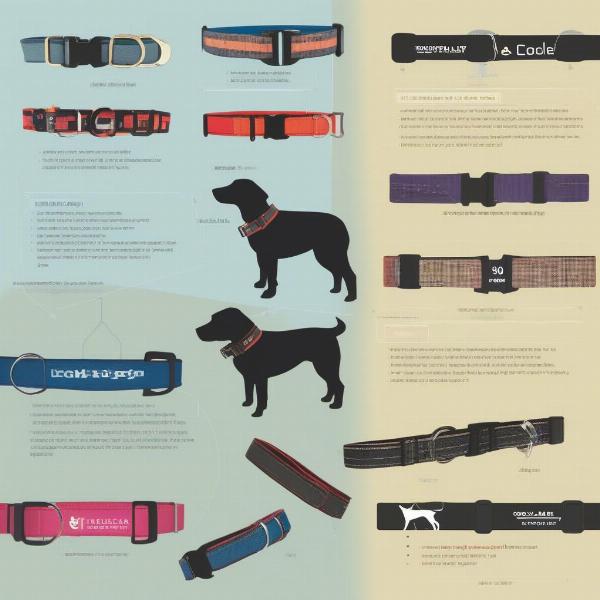Choosing the right collar for your active canine companion is crucial for both their safety and comfort. Whether your current sport dog collar is worn out, damaged, or simply no longer meeting your needs, this guide will help you navigate the world of sport dog collar replacement and find the perfect fit for your furry friend. We’ll cover everything from understanding different collar types to selecting the best materials and features.
Types of Sport Dog Collars
When considering a sport dog collar replacement, it’s important to understand the variety of options available. Each type offers unique benefits and drawbacks depending on your dog’s activity level, breed, and training needs.
- Flat Collars: These are the most common type and suitable for everyday use and basic training. They are generally made of nylon or leather and feature a buckle or quick-release closure.
- Martingale Collars: Designed for dogs who tend to slip out of their collars, martingale collars tighten gently when pulled, preventing escapes. They’re a good choice for sighthounds and other breeds with narrow heads.
- GPS Collars: For adventurous dogs or those prone to wandering, GPS collars provide peace of mind by tracking their location. These collars typically require a subscription service.
- Tracking and Training Collars (e-collars): These collars offer features like remote training capabilities, including vibration and static stimulation, along with GPS tracking. Choose e-collars with adjustable settings and prioritize positive reinforcement training methods.
 Different Sport Dog Collar Types
Different Sport Dog Collar Types
Choosing the Right Material
The material of your sport dog collar impacts its durability, comfort, and ease of cleaning.
- Nylon: A popular choice due to its strength, water resistance, and affordability. Nylon collars are easy to clean and come in a wide range of colors and patterns.
- Leather: A classic and stylish option, leather collars can be very durable but require more care and maintenance. They can also become stiff or brittle in extreme weather conditions.
- Biothane: This waterproof, odor-resistant material is a great choice for dogs who love to swim or get muddy. Biothane collars are also very durable and easy to clean.
- Metal: Metal chain slip collars are sometimes used for training, but they can be uncomfortable and even cause injury if used improperly. For everyday use, opt for a more comfortable material.
Essential Features for Sport Dog Collars
When selecting a sport dog collar replacement, consider these key features:
- Reflective Strips: Enhance visibility during nighttime walks or outdoor activities.
- Adjustable Fit: Ensure a snug and comfortable fit for your dog.
- Durable Hardware: Look for sturdy buckles, D-rings, and other hardware components.
- Nameplate Attachment: Allows you to easily attach an ID tag with your dog’s information.
Measuring Your Dog for a New Collar
Accurate measurement is crucial for a proper fit. Use a flexible tape measure and measure around your dog’s neck, allowing for two fingers of space between the collar and their skin.
Finding the Perfect Fit
Consider your dog’s breed, activity level, and training needs when choosing a sport dog collar replacement. A properly fitted collar should be snug but not restrictive. If you’re unsure which type of collar is best for your dog, consult with a professional dog trainer or veterinarian.
Conclusion
Choosing the right sport dog collar replacement is an important decision that impacts your dog’s safety, comfort, and overall well-being. By considering the factors discussed in this guide, you can find the perfect collar to suit your dog’s individual needs and enhance your adventures together.
FAQ
- How often should I replace my dog’s collar? Replace it when it shows signs of wear and tear, such as fraying, broken hardware, or if it no longer fits properly.
- Can I use a regular collar for sporting activities? While a regular collar may suffice for some activities, a dedicated sport collar often offers enhanced features like durability, water resistance, and reflective strips.
- What is the best material for a sport dog collar? Nylon and biothane are popular choices due to their durability and ease of cleaning.
- How do I clean a sport dog collar? Most nylon and biothane collars can be washed with mild soap and water.
- My dog keeps slipping out of their collar. What should I do? Consider a martingale collar or a harness.
- Are GPS collars worth the investment? If you have an adventurous dog or live in an area where they could easily get lost, a GPS collar can provide valuable peace of mind.
- What type of collar is best for training? A flat collar or a martingale collar can be used for basic training. For more advanced training, some owners opt for e-collars, but prioritize positive reinforcement methods.
Related Articles
About ILM Dog
ILM Dog is your trusted international resource for all things dog-related. We provide expert guidance on dog breeds, health, training, nutrition, grooming, and much more. From selecting the right breed to ensuring your furry friend’s well-being, ILM Dog offers practical advice and reliable information to help you provide the best possible care for your canine companion. Contact us at [email protected] or +44 20-3965-8624 for personalized support.